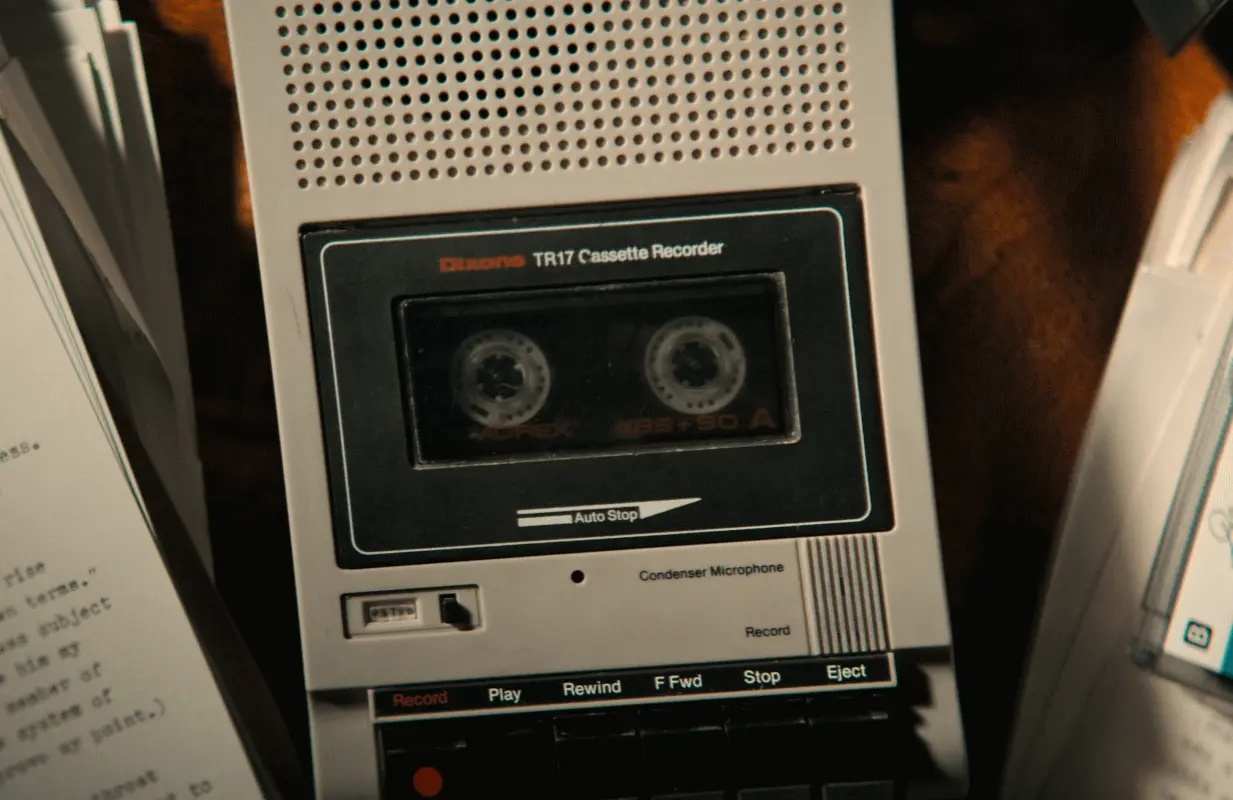Memories of a Murderer: The Nilsen Tapes Skillfully Turns a Killer's Words Against Him
-
 Memories of a Murderer: The Nilsen Tapes inverts tropes like the cassette-player B-roll. (Netflix)
Memories of a Murderer: The Nilsen Tapes inverts tropes like the cassette-player B-roll. (Netflix)The editor-in-chief of the daily newsletter Best Evidence, Sarah D. Bunting knows a thing or two about true crime. Her weekly column here on Primetimer is dedicated to all things true-crime TV.
I didn't expect to appreciate Memories of a Murderer: The Nilsen Tapes as much as I did. For one thing, its poster art and promotional materials are dominated by images of a cassette deck, meant to symbolize the recorded musings of serial killer and necrophile Dennis Nilsen, and while this particular true-crime-series trope probably couldn't be avoided given the film's title, it's still a visual cliché.
And for another thing, it's... about the recorded musings of serial killer and necrophile Dennis Nilsen, who leveraged systemic homophobia to murder at least a dozen boys and young men in the late '70s and early '80s — and to attack more than a few others, knowing that if his victims braved a report to police, law enforcement was unlikely to care as much as they should. Nilsen, who died in 2018, was also recently the subject of a prestige docudrama, Des, starring David Tennant that aired last year. Do we really need to center this ghoul in another true-crime property?
But if you stick with Memories, you'll find that director Michael Harte is asking the same question, and that he's found an innovative way of answering it. Harte, at the helm of his first feature after serving as editor on well-regarded docs like Don't F*ck With Cats and Three Identical Strangers, starts with Nilsen's voice, using tapes he recorded in prison while working on a memoir — but Harte chooses his clips wisely. When Nilsen isn't burbling about prison-lunch "hacks" or the pet budgerigar he's allowed to keep in his cell, he waxes with self-pity about the discomforts of police transport vans, or makes sneering observations like, "I'm a man, not a monster — awkward, isn't it?" Nilsen's high opinion of himself is evident, and untouched by the fact that he was busted; Nilsen also apparently believes that he can parlay his tale of sexual abuse at the hands of his grandfather into sympathy for himself as a victim, or at least understanding for the idea that he couldn't help himself. (Memories is quite explicit about what Nilsen did to the bodies of his victims after death; while it's relayed as tastefully as it can be under the circumstances, it's still disturbing, so consider this a content warning.)
But by choosing the portions of the tapes he does, Harte is challenging the idea that putting a serial killer at the center of a project has to mean glorifying that killer. And by using each segment as an opportunity to explore the other perspectives on Nilsen's tales — by interviewing investigators, journalists, survivors, and victims' family members — Harte takes the narrative power away from Nilsen, and puts it retroactively in the hands of the people whose lives Nilsen took, or scarred irreparably. For instance, when Nilsen is musing about his childhood, he sighs that "I was an inwardly troubled boy, but nobody seemed to notice"; Harte moves into a survey of press response to the case, and their preoccupation with Nilsen's homosexuality — which Nilsen wants the world to believe is a cross HE had to bear, but which former constable Karen Hunt tartly points out is how Nilsen "got away with it for so long." The shame and fear felt by Nilsen's victims and the homophobic apathy of others is referenced repeatedly.
Harte isn't all that interested, then, in Nilsen or his version of events. The tapes serve as a way into the idea that, while Nilsen is responsible for his monstrous actions, the bias and ignorance that let a society turn away from those actions with a shrug is guilty too. The film's interviews with Nilsen's living victims let them testify to their pain and humiliation, but also elevate the courage of those who gritted their teeth and came forward to give evidence against Nilsen in a hostile-at-best environment. It's a tricky tightrope, using a murderer's own accounting against him to shine a light on the prejudices that made his victims even more vulnerable — but Harte manages it in a trim hour-and-a-half film.
Memories of a Murderer joins a handful of excellent true-crime properties — among them Elon Green's book Last Call and the second season of American Crime Story — that are as much a history of the struggle of the queer community to matter to the justice system. (Particularly in regions that continued to criminalize their intimacy well into the latter half of the twentieth century.) Harte's skillful turning of Nilsen against himself is a nauseating, and post facto infuriating, 90 minutes that at the same time finds a measure of justice in the telling of the stories that survive him. It's not really about Nilsen's memories, but memories about Nilsen, and I recommend it highly.
Memories of a Murderer: The Nilsen Tapes drops Wednesday August 18th on Netflix.
Sarah D. Bunting co-founded Television Without Pity, and her work has appeared in Glamour and New York, and on MSNBC, NPR's Monkey See blog, MLB.com, and Yahoo!. Find her at her true-crime newsletter, Best Evidence, and on TV podcasts Extra Hot Great and Again With This.
TOPICS: Memories of a Murder: The Nilsen Tapes, Netflix, True Crime